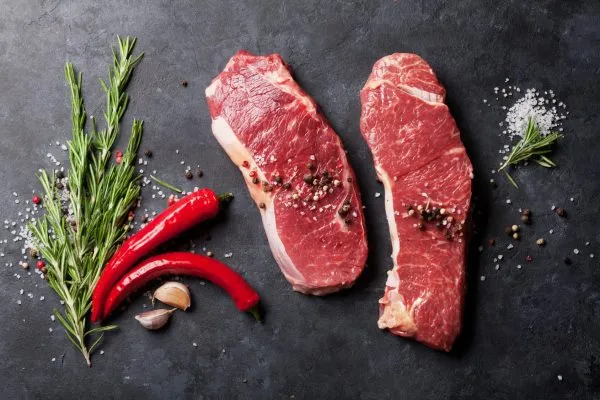In today’s health-conscious society, the NHS recommendations for red meat are wrong. This has sparked widespread debate. The guidelines suggest limiting red meat intake due to associated risks, but is this advice truly in our best interest? This blog explores the misalignment of NHS recommendations with the benefits of consuming high-quality, whole red meats, and critiques the suggested alternatives that may not be as healthy as presumed.
The Misunderstood Virtues of Red Meat Red meat, encompassing beef, lamb, pork, veal, venison, and goat, is a powerhouse of nutrition. It’s rich in essential nutrients like high-quality protein, iron, zinc, and B vitamins, particularly B12, which cannot be found in plant foods. These nutrients are crucial for muscle growth, brain function, and overall health. The NHS recommendations are wrong in not emphasizing the quality and source of red meat, which makes a significant difference in its health impacts.

Critique of NHS Alternatives
The NHS proposes reducing red and processed meat intake, suggesting swaps with vegetarian or less red meat options, many of which are ultra-processed and packed with preservatives, high in lectins, and lacking in essential nutrients. Here’s why these alternatives fall short:
Ultra-Processed Vegetarian Foods: Many vegetarian alternatives to red meat are highly processed, containing additives, stabilizers, and artificial ingredients that negate their health benefits. These foods often lack the nutritional complexity and bioavailability found in whole red meat.
Nutritional Shortcomings: Alternatives like vegetarian mince or processed chicken products do not offer the same nutrient profile as high-quality red meat. They can be deficient in critical nutrients like Vitamin B12, D3, omega-3 fatty acids, and bioavailable iron and zinc.
Health Risks of Lectins and Preservatives: Many plant-based alternatives are high in lectins and other anti-nutrients that can interfere with nutrient absorption and lead to gut inflammation. Additionally, the preservatives used in processed options pose their own health risks, further challenging the notion that these alternatives are healthier.
A Better Approach to Red Meat Consumption
Rather than avoiding red meat altogether, the focus should be on sourcing high-quality, organic, grass-fed options. These meats are not only free from harmful additives but also provide a richer nutrient profile that supports our health in line with evolutionary dietary patterns.
Quality Over Quantity: Emphasize the importance of consuming red meat that is organic, grass-fed, and free from antibiotics and hormones. This approach ensures you’re getting the health benefits of red meat without the added risks associated with conventional meat production.
Balanced Consumption: Incorporating red meat into a balanced diet, alongside other whole foods like fruits, vegetables (used judiciously), and healthy fats, can enhance nutritional intake and support overall health. Moderation and variety are key.
Critical Analysis of Guidelines: It’s crucial to critically analyze generalized health guidelines and consider individual needs and circumstances. The broad recommendations provided by the NHS fail to account for the nuanced differences between processed and high-quality meats, oversimplifying a complex issue.

Whole Foods Philosophy
The core philosophy of Organic Oasis underscores the importance of embracing whole, unprocessed foods for achieving optimal health. This principle is particularly relevant when it comes to red meat consumption. High-quality, organic, grass-fed red meat is fundamentally different from processed meats that are often laden with harmful additives. The former offers a plethora of nutritional benefits, owing to its natural upbringing and absence of artificial hormones, preservatives, or stabilizers. These meats are richer in omega-3 fatty acids, conjugated linoleic acid (CLA), and antioxidants such as vitamin E, directly linked to reduced inflammation and a lower risk of chronic diseases. The stark contrast in nutrient composition between grass-fed and conventionally raised meats underscores the misguided nature of blanket recommendations against red meat consumption. Emphasizing the source and quality of red meat, therefore, is crucial in discussions about dietary guidelines and health outcomes. This is why some consider that the NHS recommendations are wrong.
Nutrient Density
The nutritional superiority of red meat is an undeniable fact, with its unique composition of nutrients that are not easily replicated in other food sources. Heme iron, found abundantly in red meat, is far more bioavailable than the non-heme iron present in plant-based foods, making it vital for combating iron-deficiency anemia. Furthermore, red meat provides a complete amino acid profile, essential for the repair and maintenance of body tissues, alongside significant amounts of zinc and vitamin B12, crucial for immune function and neurological health, respectively. The presence of these nutrients in a bioavailable form means that the body can more efficiently utilize them, highlighting the inadequacy of the NHS’s recommendations which fail to consider the qualitative differences in nutrient sources. By prioritizing the consumption of nutrient-dense, high-quality red meat, individuals can support their bodily functions more effectively, aligning with Organic Oasis’s advocacy for a diet that mirrors our ancestral nutritional patterns for optimal health. With this in mind, many believe that the NHS recommendations are wrong at that more knowledge about nutrients should be explained.
Evolutionary Diet
The diet of our ancestors was rich in animal proteins and fats, a testament to the evolutionary adaptation of our digestive systems to efficiently process and derive nutrition from red meat. This historical dietary pattern suggests that our bodies are inherently designed to thrive on the nutrients provided by animal sources. Modern dietary guidelines, including those proposed by the NHS, often overlook this evolutionary perspective, promoting a one-size-fits-all approach that negates the complexity of human nutrition and dietary needs. The ancestral diet underscores the importance of consuming foods that are consistent with our evolutionary heritage, such as high-quality red meat, for maintaining health and preventing disease. This perspective not only challenges the current dietary recommendations but also supports the notion that a diet aligned with our evolutionary past is key to optimizing health. By reverting to a diet that includes organic, grass-fed red meat, we can support our body’s natural functions and promote a state of health that mirrors the robustness of our ancestors.
In conclusion, while the NHS recommendations for reducing red meat intake stem from concerns about health risks, they overlook the significant benefits of consuming high-quality, organic red meat. By critiquing the suggested alternatives, it’s clear that a more nuanced approach, focusing on the source and quality of red meat, aligns better with optimal health and dietary needs. The philosophy at Organic Oasis champions this view, advocating for a return to whole, unprocessed foods that honor our evolutionary heritage and support our health in the most natural way. This is based on NHS guidelines posted here.